8 Things You May Never See in Hotel Rooms Ever Again
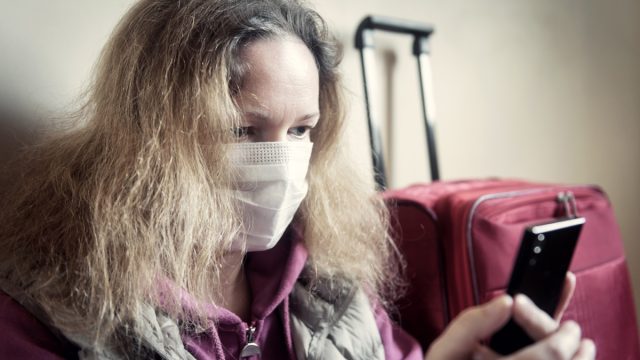
The coronavirus pandemic has undeniably changed the travel landscape, with vacations and business trips being put on hold indefinitely. According to the American Hotel & Lodging Association, as of May 6, 2020, seven out of 10 stateside hotel rooms were unoccupied—and when guests return to those accommodations, things are unlikely to look the way they did prior to COVID-19.
So, which design features and amenities are getting axed? Read on to discover just how hotels will be changing in response to coronavirus concerns. And for more ways your vacations will be different, check out these 7 Things You Won’t See at Disney World Ever Again After Coronavirus.
1
No more minibars
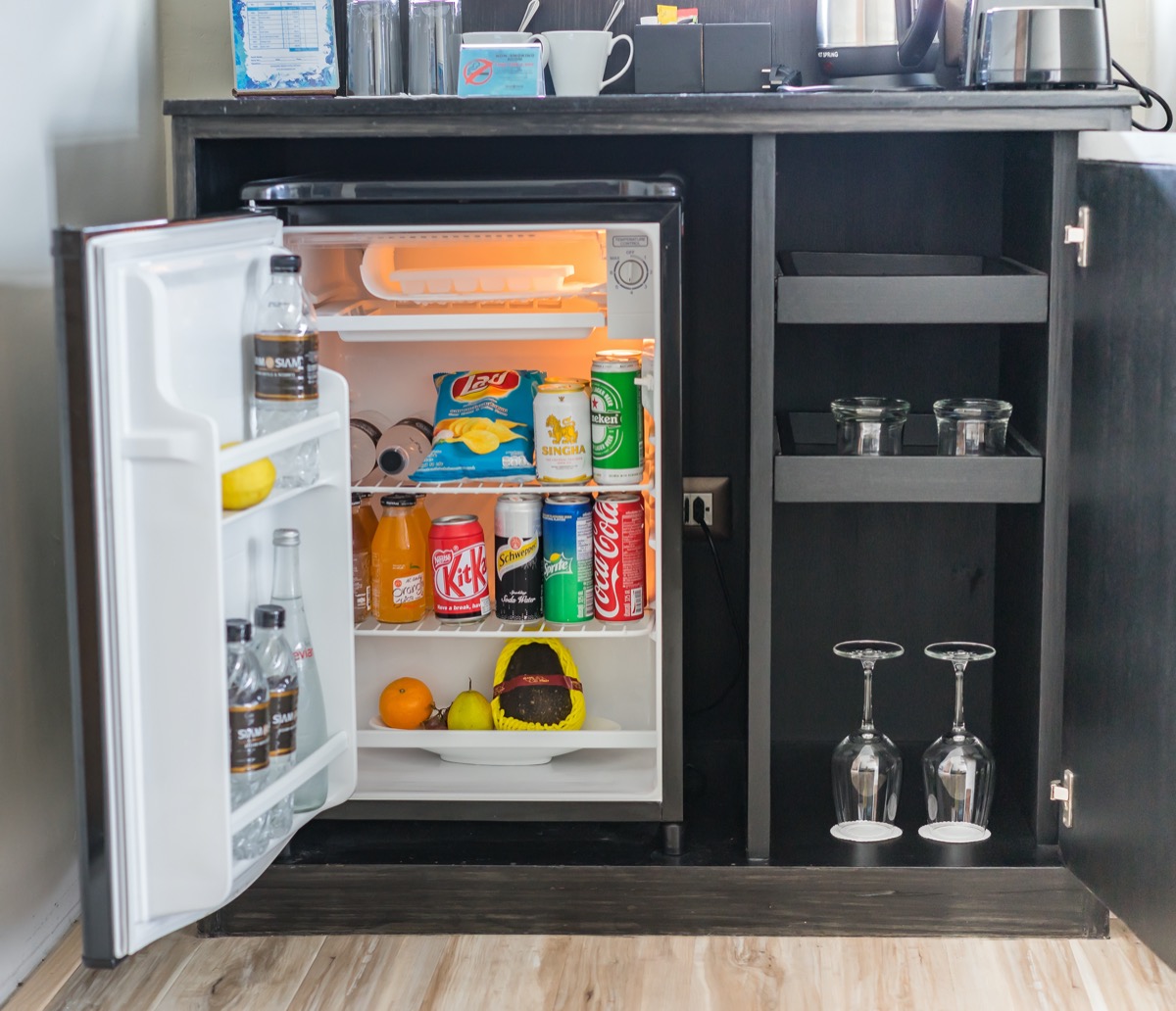
Unfortunately, late-night snacks and early-morning coffee will be a thing of the past. Hotels have stopped stocking minibars and have removed coffee makers and glasses in order to reduce touch points.
This is a good call considering a 2015 study published in Scientific Reports found strains of bacteria like bacillus and pseudomonas in the coffee waste reservoirs of 10 different Nespresso machines. And for more incentive to bring your cleaning supplies along with you when you travel, These Are the Germiest Spots in a Hotel Room.
2
No more room service

Let’s face it, paper is virtually impossible to effectively clean, meaning those room service menus are rarely getting the sanitizing treatment they should.
“You will need a way—perhaps digitally—to request room service,” says licensed architect Colin Haentjens, a designer with The Knobs Company.
Haentjens explains that, in some cases, this may even mean cutting the hotel kitchens and room service runners entirely, to help mitigate the contact concerns of some more virus-vigilant guests.
3
No more key cards
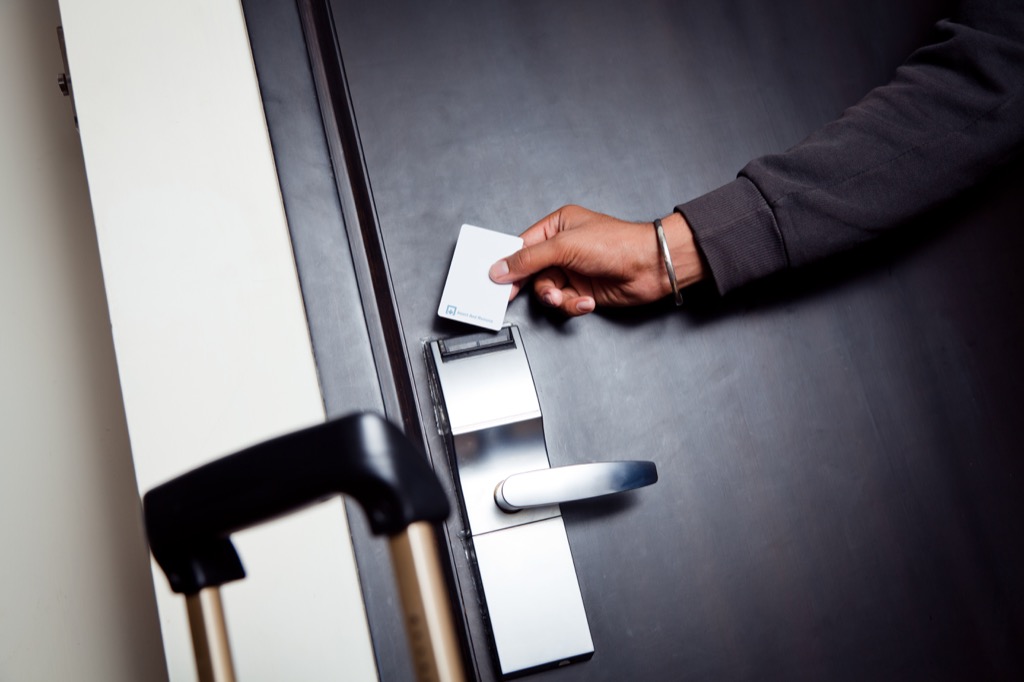
Taking a page from beloved travel destinations like Disney resorts, you may be able to use your own device—instead of a recycled room key—to enter your hotel room.
“The idea of cards will be unpalatable to guests,” even after the pandemic subsides, says Haentjens. Similarly, Haentjens predicts that door knobs themselves will soon be a thing of the past: “While it would be a huge expense for hotels, doors may rely on automatic, touchless openers so you no longer have to touch handles,” he says. And for more way your travel plans may change, check out these 13 Things You May Never See on Airplanes Again After Coronavirus.
4
No more desks
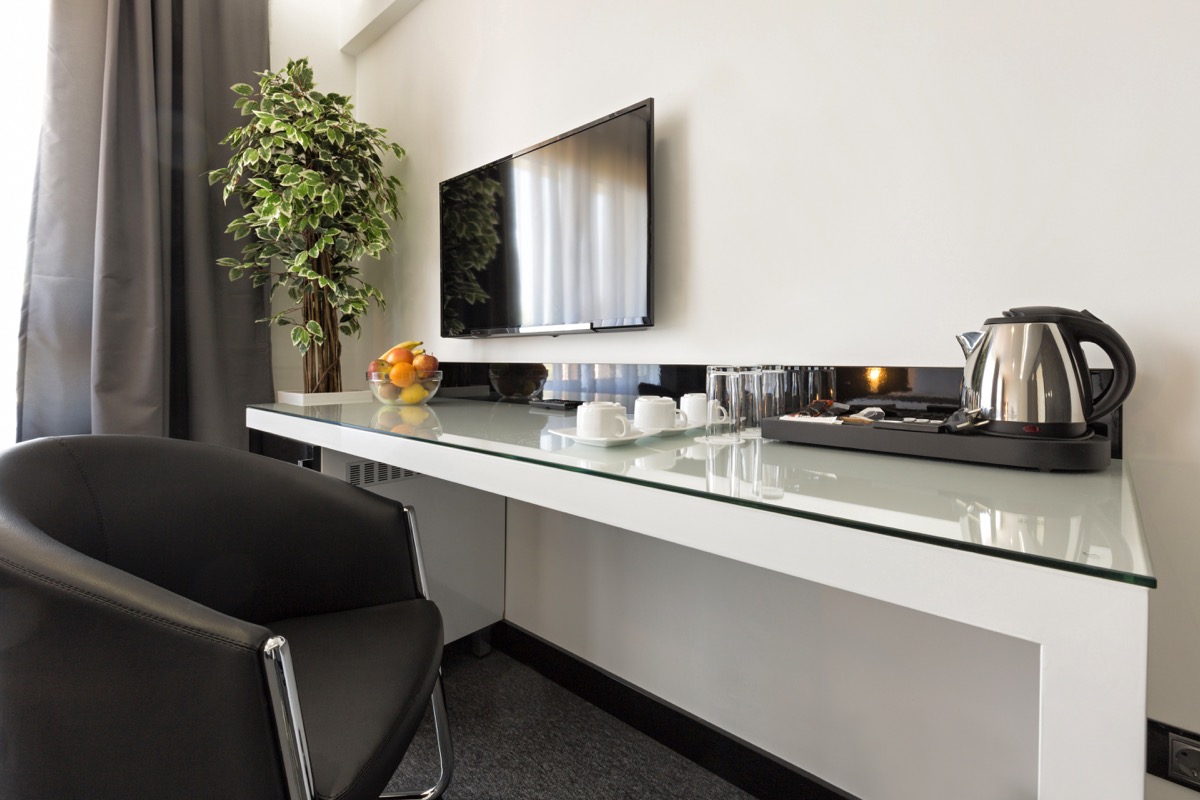
Don’t expect to pen the Great American Novel during your next hotel stay—unless you’re comfortable writing in bed, that is.
According to research from TravelMath, desks were among the most contaminated surfaces in hotel rooms, with an average of 614,907 colony-forming bacterial units (CFU) per square inch.
5
No more remote controls

If you’re thinking about picking up that remote without wiping it down first, you’re going to want to reconsider. “I believe remotes could be phased out of hotels and replaced by cell phone apps that could take their place, removing one more touch point in hotel rooms going forward,” says Alex Kirkwood, founder of the Kirkwood Collection, a group of boutique hotels.
In fact, according to 2012 research from the American Society for Microbiology, remote controls are among the most contaminated objects in the average hotel room, and with so many hands touching them, they’re a perfect vector for coronavirus transmission.
6
No more touch-controlled fixtures
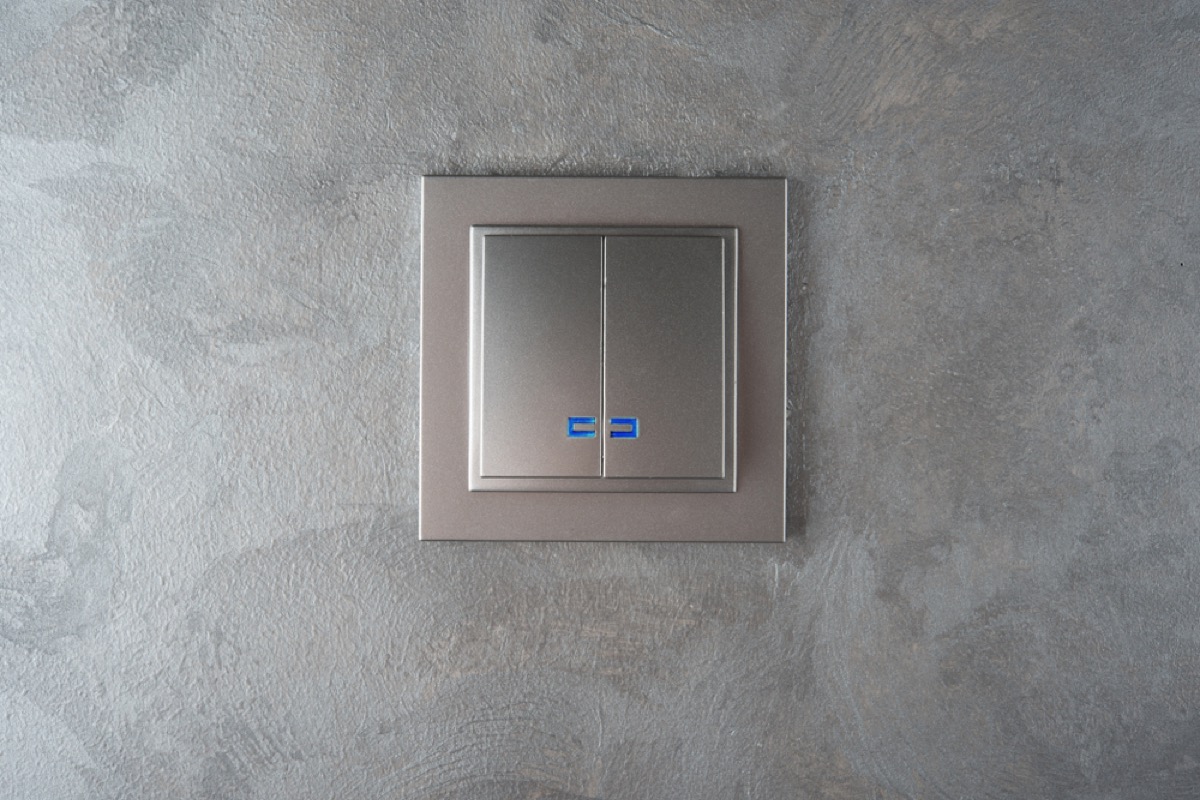
Automation will be the name of the game in the not-too-distant future, meaning you may never have to manually flush a toilet—or even turn on a light—in a hotel room again.
“Gesture controlled flushing, sensor-driven taps [and] lighting will become the new standard industry-wide,” says travel expert Deb Pati, founder of The Visa Project.
7
No more hot tubs

Lounging in a hot tub with friends may have once seemed like a relaxing escape, but coronavirus might just have you thinking twice about setting foot in one again.
“These places can increase the chance of guests getting contaminated since they are enclosed in close quarters, in warm and humid conditions for prolonged periods of time,” says travel expert Torbin Lonne, co-founder of DIVEIN.com. So, just how icky are they? According to a 2011 study published in the International Journal of Environmental Research and Public Health, all residential hot tubs and 70 percent of public hot tubs tested were positive for the P. aeruginosa bacteria, which can cause serious infections throughout the body, from the skin to the digestive tract.
8
No more micro hotel rooms
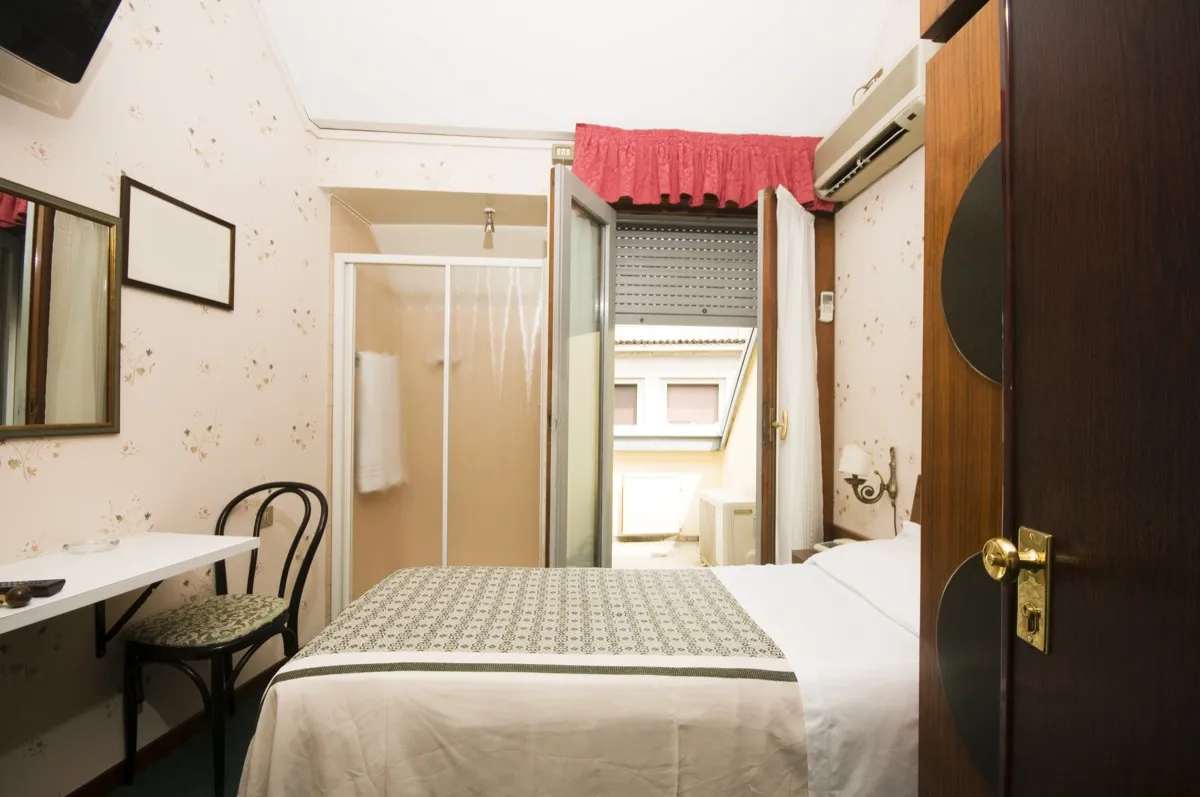
In order to keep hotel rooms clean and sanitary going forward, the average room’s footprint is about to get a whole lot bigger.
“Health and wellness goals will accelerate the demise of rooms that are too small to vacuum between the bed and the wall, and a certain level of hygiene theater will be necessary to reassure guests that their accommodations are sanitized,” explains Angie Lee, partner and design director of interiors at architecture firm FXCollaborative. And for more travel changes to prepare for, discover these 7 Things You’ll Never See in Airports Ever Again.